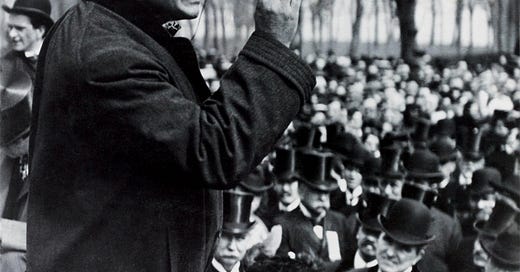The Strenuous Life by Theodore Roosevelt
Highlights from the strenuous president's edifying address.
In Chicago on April 10, 1989, Teddy Roosevelt addressed the Hamilton Club about the perils of living a struggle-free life and the virtue of intentionally facing life and its difficulties head-on. In what has been dubbed “The Strenuous Life”, this speech epitomizes the philosophy of life that he not only embodied himself but expected from the country that he would soon command. Never the man to ask of others that which he did not do himself, Teddy instilled in those present at the speech and us who read it thereafter a passion and vision for excellence.
His encouragement to uphold high standards for oneself and to strive for greatness especially resonates with my current phase of life. So, without doing this great man any injustice, allow me to share several excerpts that are far more eloquent than I could have put myself.
“I wish to preach, not the doctrine of ignoble ease, but the doctrine of the strenuous life, the life of toil and effort, of labor and strife; to preach that the highest form of success, which comes not to the man who desires mere easy peace, but to the man who does not shrink from danger, from hardship or from bitter toil, and who out of these wins the splendid ultimate triumph.”
“A life of slothful ease, a life of that peace which springs from either lack of desire or of power to strive after great things is as little worthy of a nation as of an individual.”
“We do not admire the man of timid peace. We admire the man who embodies victorious effort; the man who never wrongs his neighbor, who is prompt to help a friend, but who has those virile qualities necessary to win in the stern strife of actual life.”
“It is hard to fail, but it is worse to never have tried to succeed. In this life, we get nothing save by effort.”
“A mere life of ease is not, in the end, a very satisfactory life, and, above all, it is a life which ultimately unfits those who follow it for serious work in the world.”
“The man must be glad to do a man’s work, to dare and endure and to labor.”
“We cannot… be content to rot by inches in ignoble ease… heedless of the higher life, the life of aspiration, of toil and risk, busying ourselves only with the wants of our bodies for the day, until suddenly we should find… in the end, to go down before other[s] which have not lost the manly and adventurous qualities.”
“If we are really great people, we must strive in good faith to play a great part in the world. We cannot avoid meeting great issues. All that we can determine for ourselves is whether we shall meet them well or ill.”
“The timid man, the lazy man, the man who distrusts his country, the over-civilized man, who has lost the great fighting, masterful virtues, the ignorant man, and the man of dull mind, whose soul is incapable of feeling the mighty lift that thrills “stern men with empires in their brains” - all of these, of course, shrink from seeing the[m] undertake its new duties… These are the men who fear the strenuous life, who fear the only life which is really worth leading.”
“Let us therefore boldly face the life of strife, resolute to do our duty well and manfully; resolute to uphold righteousness by deed and by word; resolute to be both honest and brave, to serve high ideals, yet to use practical methods. Above all, let us shrink from no strife, moral or physical, provided we are certain the strife is justified, for it is only through strife, through hard and dangerous endeavor, that we shall ultimately win the goal of true greatness.”




